Liturgical Arts for Our Times
During the first year of the Covid-19 pandemic, Bayit gathered a group of rabbis, artists, and writers to collaboratively create liturgy we hoped would speak to people where they (we) were: tools for “building Jewish” for the spiritual needs of this moment and beyond.
To create each offering we meet and brainstorm. We take some time to draft art and words. We reconvene to workshop that material and give each other feedback, and sometimes we create new art or liturgical poetry in response to each others’ creativity. After another revision period, we curate a flow so that the whole offering can be more than the sum of its parts. The whole offering always is more than the sum of its parts.
In the same way that a pair of hevruta partners can find insights in Torah they wouldn’t have found alone, our group hevruta work hones and polishes our collaboration into something that none of us ever could have created alone. Best of all, what we’re creating is reaching people: in shuls, at home, alone and together, around the globe.
Here are our emerging offerings. The most recent materials are at the top.

Shalom / Grant Peace
The closing blessing of the Amidah asks for shalom: peace, wholeness, completion. What does this prayer mean to us today? What does it ask of God – and of us? What does it mean to ask for peace in a time of tumult and injustice? How can we ask for something we may not even wholly understand? This offering arises out of those questions and more. We hope it speaks to you, and we hope it helps you to pray some of what’s on your heart.
Includes work by Trisha Arlin, R. Rachel Barenblat, Mike Cockrill, R. Sonja Keren Pilz PhD, Steve Silbert, and R. David Zaslow. Find it here: Grant Peace.
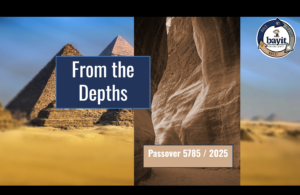 From the Depths
From the Depths
Once again, Passover approaches amidst some anxiety and uncertainty. Many of us are living in Mitzrayim / meitzarim / constriction. And once again, Pesach comes to remind us that our tradition’s quintessential message of freedom rings out even (or especially) in times like these. Pesach promises us a future that is better than our past. These poems, prayers, and artworks express some of what’s on our hearts as we prepare for seder this year. We hope they offer you some of what you need, including hope that together we can find our way to liberation.
Includes work by Trisha Arlin, R. Rachel Barenblat, R. Sonja Keren Pilz PhD, Flash Rosenberg, and R. David Zaslow. Find it here: From the Depths.
 Hoda’ah / Gratitude
Hoda’ah / Gratitude
“We are grateful before You.” Is gratitude innate? Is it part of who we are? What if we don’t feel grateful? What if we can’t feel grateful? What forms does our gratitude take? What are the challenges of gratitude? How might we grow in gratitude? What about when gratitude is bittersweet? Here are some of our answers to these questions. We hope they speak to you.
This offering features work by Trisha Arlin, R. Rachel Barenblat, Joanne Fink, R. Sonja Keren Pilz, Steve Silbert, and R. David Zaslow. Find it here: Hoda’ah / Gratitude.
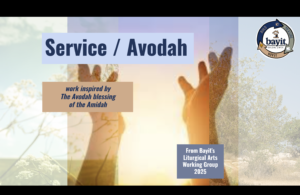 Avodah / Service
Avodah / Service
The Hebrew word avodah implies service, work, and prayer. Is service the same as serving or servitude? What do we serve? Who or Whom do we serve? How do we serve? Ancient temple sacrifice was known as avodah; so now is the holy work we call avodah she-ba-lev, the “service of the heart.” Is service the same as prayer? Is all work a form of service? How do we (want to) serve today? These questions, and others, animate our collective offering on the theme of avodah. We hope that our offering serves to open up your deep questions, too.
This offering features work by Trisha Arlin, R. Rachel Barenblat, R. Sonja Keren Pilz, and R. David Zaslow. Find it here: Avodah / Service
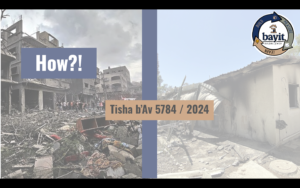 Tisha b’Av 5784: How?!
Tisha b’Av 5784: How?!
On Tisha b’Av we confront the world’s brokenness, and our own. In many ways, 5784 has felt like a whole year of Tisha b’Av. These words are some of our hearts’ cries this year as Tisha b’Av approaches.
This offering features work by Trisha Arlin, R. Rachel Barenblat, R. David Evan Markus, R. Sonja Keren Pilz, and R. David Zaslow. Find it here: Tisha b’Av 5784: How?!
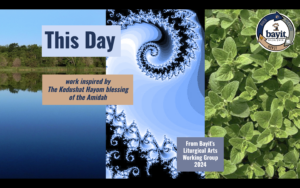 This Day – Kedushat HaYom
This Day – Kedushat HaYom
The fourth blessing in the Shabbat Amidah speaks about the “holiness of this day.” Is Shabbat’s holiness unique, is it innate, what role do we play in it, how does it change us? How do we understand the day: as a “sign,” as emptiness and fullness, as an invitation into God’s own pleasure? This collaborative offering of liturgy, poetry, and art explores some of what this blessing means to us. We hope it will open up these words of prayer in new ways also for you.
This offering features work by Trisha Arlin, R. Rachel Barenblat, Joanne Fink, R. Sonja Keren Pilz, Steve Silbert, and R. David Zaslow. Find it here: This Day – Kedushat HaYom.
 This Broken Matzah: Pesach 2024
This Broken Matzah: Pesach 2024
How do we celebrate Pesach in a year like this one? Everything about the seder lands differently after the last six months. This offering emerges out of our grief and our hope. No two pieces are coming from exactly the same place. There are so many emotions — even within a single heart, much less around any given seder table. We hope these prayers, poems, and works of art will help you make this Pesach what you need it to be.
This offering features work by Trisha Arlin, R. Rachel Barenblat, Joanne Fink, R. Dara Lithwick, R. David Evan Markus, R. Sonja Keren Pilz, Steve Silbert, and R. David Zaslow. Find it here: This Broken Matzah: Pesach 2024
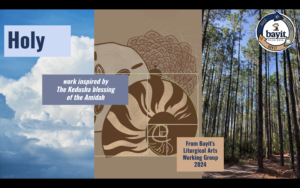 Kedusha: Holy
Kedusha: Holy
The third blessing of the Amidah speaks of kedusha, holiness. What does it mean to be holy, or to say that God is holy? What might angels, or our bodies, have to do with it? How about the planet, the cosmos, the elegance of mathematics? Does holiness have a “where”? This offering emerges out of these questions and more. This offering also arises during continuing war between Israel and Hamas. The prayer, worry, and grief in which our hearts continue to steep shapes our sense of holiness too, and our yearning for holiness, whatever it might be.
This offering features work by Trisha Arlin, R. Rachel Barenblat, Mike Cockrill, Sherrill Cropper, Joanne Fink, R. Sonja Keren Pilz, Steve Silbert, and R. David Zaslow. Find it here: Amidah Offering – Kedusha / Holy.
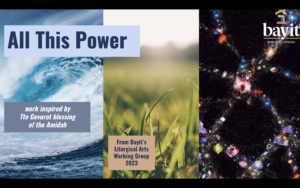 Gevurot: All This Power
Gevurot: All This Power
The second blessing of the Amidah speaks to a God of gevurah: strength, heroism, boundaries, power. This blessing names God as the One Who enlivens the dead (or the deadened, or all things). Here we bless God either as the One Who brings rain and wind, or the One Who calls forth the dew. What do these ideas mean for us? What does gevurah imply for us? How does this prayer speak for us (or does it speak for us)? Where does this blessing take us? These are among the questions that animated our collaborative work on this offering of liturgy, poetry, and art.
This Amidah collaboration features work from Trisha Arlin, Mike Cockrill, R. Rachel Barenblat, Joanne Fink, R. Sonja Keren Pilz, Emily Rogal, Steve Silbert, and R. David Zaslow. Available, as always, as downloadable PDF and also as slides suitable for screenshare. Find it here: Amidah Offering: All This Power / Gevurot.
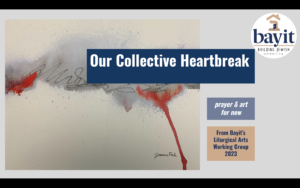
Our Collective Heartbreak
Disbelief, fear, anger, grief, despair, love, anguish, longing, solidarity, alienation, hope: since October 7 we’ve felt all of these and more. This is our attempt to give voice to some of what’s in our hearts. We hope that it will speak to and for your heart too. May these words help us through these difficult days and into the work of building the just peace of which we dream.
This collaboration features work from Trisha Arlin, Mike Cockrill, Sherrill Cropper, R. Rachel Barenblat, Joanne Fink, R. Allie Fischman, R. Bracha Jaffe, R. Dara Lithwick, R. David Evan Markus, R. Sonja Keren Pilz, and R. David Zaslow. Available, as always, as downloadable PDF and also as slides suitable for screenshare. Find it here: Our Collective Heartbreak.
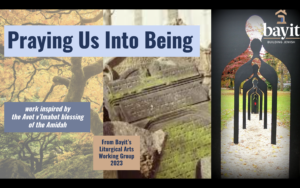 Avot v’Imahot: Ancestors
Avot v’Imahot: Ancestors
The first blessing of the Amidah names God as “God of” Abraham, Isaac, and Jacob, and in liberal Jewish spaces, also God of Sarah, Rebecca, Rachel, and Leah. What does it mean to us to connect with holiness through our ancestors? How do we understand our lineage and our relationship to it? What traces do our generations leave for us? How does this prayer speak for us (or does it speak for us) — and can we affirm its vision of a relational God? These are some of the questions that animated our collaborative work on this offering of liturgy, poetry, and art.
This Amidah collaboration features work from Trisha Arlin, Mike Cockrill, R. Rachel Barenblat, Joanne Fink, R. Sonja Keren Pilz, Steve Silbert, and R. David Zaslow. Available, as always, as downloadable PDF and also as slides suitable for screenshare. Find it here: Amidah Offering – Ancestors.
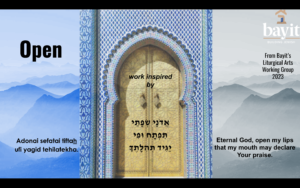 Adonai S’fatai: Open
Adonai S’fatai: Open
With this offering we’re beginning a new project: liturgy, poetry, and art crafted in conversation with / arising out of / inspired by the blessings of the Amidah.
Here is new work arising out of Adonai s’fatai tiftach, the one-line meditation that opens the Amidah. Pray these in community or on your own. Add pages from the PDF to photocopied handouts, or add slides from the slide deck to services. Make one of the slides the desktop background on your computer, or use some of the art as wallpaper for your phone. (Or use them in some other way — and tell us what works for you.) Use these in whatever way will best enable these words and images to speak to and for your heart.
This first Amidah collaboration features work from Trisha Arlin, R. Rachel Barenblat, Joanne Fink, R. Sonja Keren Pilz, Steve Silbert, and R. David Zaslow. Available, as always, as downloadable PDF and also as slides suitable for screenshare. Find it here: Amidah Offering – Adonai S’fatai.
 The Light Travels: Hanukkah 5783
The Light Travels: Hanukkah 5783
New from Bayit’s Liturgical Arts Working Group comes this offering of new liturgy, poetry, and art for Hanukkah — this year arising both from the climate crisis, and from the perennial interplay of light and dark, particle and wave, what is and what might yet be. Featuring work by Trisha Arlin, R. Rachel Barenblat, Joanne Fink, R. Dara Lithwick, and R. David Zaslow. Available both as a downloadable PDF and as slides suitable for personal use or digital screenshare. We hope these pieces will speak to you in the ways you most need this year. Find the whole collection here: The Light Travels.
 For Earth’s Sake: Days of Awe 5783
For Earth’s Sake: Days of Awe 5783
New from Bayit’s Liturgical Arts Working Group comes this offering of new liturgy, poetry, and art for Rosh Hashanah and Yom Kippur — this year crafted with a focus on the climate crisis, through the lens of the story of R. Simcha Bunim and his two slips of paper. We hope these pieces will speak to you in the ways that your teshuvah journey most needs. Also part of this offering are Steve Silbert’s contemplative Finding Balance cards — learn more on the Bayit Games page. Available both as a downloadable PDF and as slides suitable for screenshare. May these prayers and poems fuel our teshuvah and the work that will follow. Features work by Trisha Arlin, R. Rachel Barenblat, Steve Silbert, and R. David Zaslow. Find the whole collection here: For Earth’s Sake.
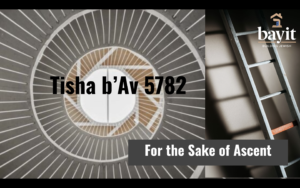 For the Sake of Ascent: Tisha b’Av 5782
For the Sake of Ascent: Tisha b’Av 5782
Between ongoing pandemic, the climate crisis, the loss of rights in the United States, and fears for the future, we may feel that every day has become like Tisha b’Av. This year the holiday falls on Shabbat, so it will be observed on the following day — which is the first day of the Reverse Omer, the 49 days between Tisha b’Av and Rosh Hashanah. Our offering this year aims to harness that energy: noticing and naming what’s broken within us and around us, and letting that awareness fuel the teshuvah journey that will lift us up to build a better world. This collection features work by Trisha Arlin, R. Rachel Barenblat, R. Dara Lithwick,. Sonja Keren Pilz PhD, Steve Silbert, R. Jennifer Singer, and R. David Zaslow. We’re also grateful to artist Mike Cockrill for letting us share his painting. Find PDF and slides here: For the Sake of Ascent: Tisha b’Av 5782.
Step by Step: Omer 5782
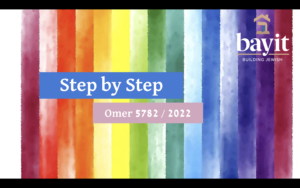 New from Bayit’s Liturgical Arts Working Group comes this offering for the Omer 5782, available both as a printable PDF and as google slides suitable for screensharing. Here you’ll find one new prayer-poem for each week of the Omer journey, as well as a new prayer before counting, and a collaborative piece that integrates the journey as we reach the cusp of Shavuot. This collection features work by Trisha Arlin, R. Rachel Barenblat, R. Bracha Jaffe, R. Dara Lithwick, R. David Evan Markus, R. Sonja Keren Pilz PhD, and R. David Zaslow. Find PDF and slides here: Step by Step: Omer 5782.
New from Bayit’s Liturgical Arts Working Group comes this offering for the Omer 5782, available both as a printable PDF and as google slides suitable for screensharing. Here you’ll find one new prayer-poem for each week of the Omer journey, as well as a new prayer before counting, and a collaborative piece that integrates the journey as we reach the cusp of Shavuot. This collection features work by Trisha Arlin, R. Rachel Barenblat, R. Bracha Jaffe, R. Dara Lithwick, R. David Evan Markus, R. Sonja Keren Pilz PhD, and R. David Zaslow. Find PDF and slides here: Step by Step: Omer 5782.
For Such a Time as This: Purim 5782
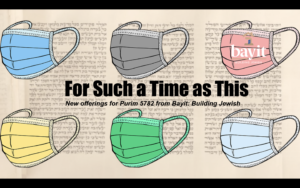 New from Bayit’s Liturgical Arts Working Group comes this offering for Purim 5782, available both as a printable PDF and as illuminated google slides suitable for screensharing. Here you’ll find a new Al Ha-Nisim for our pandemic era, poems and prayers on themes of masks and revelation, reflections connecting Purim with what’s unfolding in the world around us, and more. This collection features work by Trisha Arlin, R. Rachel Barenblat, R. Bracha Jaffe, R. Dara Lithwick, R. David Evan Markus, R. Sonja Keren Pilz PhD, and R. David Zaslow. Find PDF and slides here: For Such a Time as This: Purim 5782 from Bayit.
New from Bayit’s Liturgical Arts Working Group comes this offering for Purim 5782, available both as a printable PDF and as illuminated google slides suitable for screensharing. Here you’ll find a new Al Ha-Nisim for our pandemic era, poems and prayers on themes of masks and revelation, reflections connecting Purim with what’s unfolding in the world around us, and more. This collection features work by Trisha Arlin, R. Rachel Barenblat, R. Bracha Jaffe, R. Dara Lithwick, R. David Evan Markus, R. Sonja Keren Pilz PhD, and R. David Zaslow. Find PDF and slides here: For Such a Time as This: Purim 5782 from Bayit.
Sap Rising: Tu BiShvat 5782
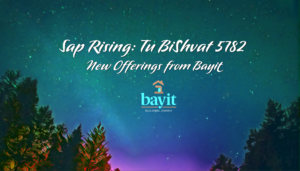 For Tu BiShvat 5782, here are four new variations on Tu BiShvat’s traditional four cups of wine or juice; prayers and meditations on Tu BiShvat in this time of climate crisis; an updated variation on Reb Nachman’s “Grant me the ability to be alone” prayer for our Zoom / pandemic moment; and more. Available both as a printable PDF and as illuminated google slides suitable for screensharing.
For Tu BiShvat 5782, here are four new variations on Tu BiShvat’s traditional four cups of wine or juice; prayers and meditations on Tu BiShvat in this time of climate crisis; an updated variation on Reb Nachman’s “Grant me the ability to be alone” prayer for our Zoom / pandemic moment; and more. Available both as a printable PDF and as illuminated google slides suitable for screensharing.
Featuring work by Trisha Arlin, R. Rachel Barenblat, R. Dara Lithwick, Joanne Fink, R. David Evan Markus, and R. David Zaslow. Preview slides and PDF and download here: Sap Rising: Tu BiShvat 5782.
Rolling Darkness Into Light: Chanukah 5782
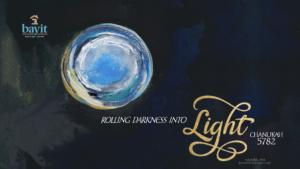 The pandemic has become endemic, and our planet is imperiled. Chanukah comes not to distract us from these realities, but to offer a path through them. Chanukah is about what fuels us even when we feel empty (or maybe especially then). Our liturgy speaks of God Who rolls light out of darkness and darkness out of light. May these prayers, poems, and artworks sustain us as we find the holiness both in today’s darkness and in our turn toward increasing light.
The pandemic has become endemic, and our planet is imperiled. Chanukah comes not to distract us from these realities, but to offer a path through them. Chanukah is about what fuels us even when we feel empty (or maybe especially then). Our liturgy speaks of God Who rolls light out of darkness and darkness out of light. May these prayers, poems, and artworks sustain us as we find the holiness both in today’s darkness and in our turn toward increasing light.
Available both as a printable PDF and as illuminated google slides suitable for screensharing. Featuring work by Trisha Arlin, R. Rachel Barenblat, R. Dara Lithwick, Joanne Fink, R. David Evan Markus, R. Sonja K. Pilz PhD, and R. David Zaslow. Read excerpts, preview the slides, and download here: Darkness Into Light.
Gates, Open and Closing
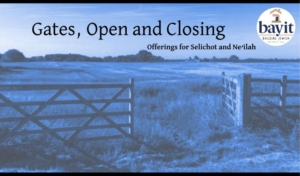 These offerings are bookends for the Days of Awe. Here are poems, prayers, and artworks for Selichot and for Ne’ilah, the near and far thresholds of this holy season. May they help these holidays lift our spirits and open our hearts. And may the new year bring blessing not only to us but to the whole aching world. Available both as a downloadable PDF and as google slides suitable for screenshare. Featuring work by Trisha Arlin, R. Rachel Barenblat, Joanne Fink, R. David Evan Markus, R. Sonja K. Pilz PhD, and Steve Silbert.
These offerings are bookends for the Days of Awe. Here are poems, prayers, and artworks for Selichot and for Ne’ilah, the near and far thresholds of this holy season. May they help these holidays lift our spirits and open our hearts. And may the new year bring blessing not only to us but to the whole aching world. Available both as a downloadable PDF and as google slides suitable for screenshare. Featuring work by Trisha Arlin, R. Rachel Barenblat, Joanne Fink, R. David Evan Markus, R. Sonja K. Pilz PhD, and Steve Silbert.
Read excerpts and download here: Gates, Open and Closing (Selichot and Ne’ilah 5782)
From Narrow Places: Poetry, Liturgy, and Art of the Pandemic Era.
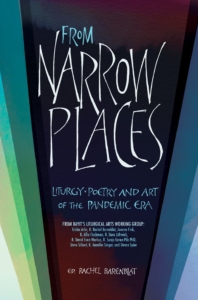 From Narrow Places collects poetry, liturgy, and art co-created by Bayit’s Liturgical Arts Working Group — a pluralist group of rabbis, liturgists, and artists — during the first eighteen months of COVID-19.
From Narrow Places collects poetry, liturgy, and art co-created by Bayit’s Liturgical Arts Working Group — a pluralist group of rabbis, liturgists, and artists — during the first eighteen months of COVID-19.
“From the narrow place, I called to You; You answered me with Your expansiveness,” says the Psalmist. We cried out from the pandemic’s narrow place, hoping to access holy response in our expansiveness of liturgy, poetry, and art. These offerings of word and image are tools for “building Jewish” that we hope speak to the spiritual needs of this moment and beyond.
This volume collects work by Trisha Arlin, R. Rachel Barenblat, Joanne Fink, R. Allie Fischman, R. Dara Lithwick, R. David Evan Markus, R. Sonja Keren Pilz PhD, Steve Silbert, R. Jennifer Singer, and Devon Spier. Read more about it, including advance praise, here.
Available for $18. Published January 2022.
Rosh Hodesh Elul / New Year of the Animals
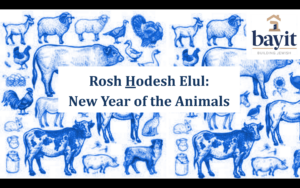 Judaism’s ancient New Year for the Animals can remind us that we’re all stewards of the Earth and all her life. It can remind us that we too are animals, part of the web of life. It can remind us of the special love we feel for companion animals – a heart-opening love we need as we prepare for the heart journey of Rosh Hashanah. Here are poems, prayers, and artwork for Rosh Hodesh Elul / the New Year of the Animals. May these offerings help us to draw near to our animals, our traditions, ourselves, each other, and our Source. Available both as a downloadable PDF and as google slides suitable for screenshare. Co-created by Trisha Arlin, R. Rachel Barenblat, Joanne Fink, R. Dara Lithwick, R. David Markus, and R. Sonja Keren Pilz.
Judaism’s ancient New Year for the Animals can remind us that we’re all stewards of the Earth and all her life. It can remind us that we too are animals, part of the web of life. It can remind us of the special love we feel for companion animals – a heart-opening love we need as we prepare for the heart journey of Rosh Hashanah. Here are poems, prayers, and artwork for Rosh Hodesh Elul / the New Year of the Animals. May these offerings help us to draw near to our animals, our traditions, ourselves, each other, and our Source. Available both as a downloadable PDF and as google slides suitable for screenshare. Co-created by Trisha Arlin, R. Rachel Barenblat, Joanne Fink, R. Dara Lithwick, R. David Markus, and R. Sonja Keren Pilz.
Read excerpts and download here: Rosh Hodesh Elul / New Year of the Animals 5781.
Tisha b’Av 5781: Our Mourning Year
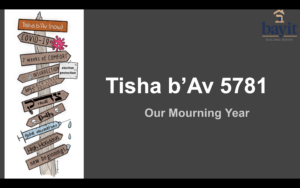 Here are poems, prayers, artwork, and readings for Tisha b’Av 2021, looking back on the last pandemic year as we sit with what’s broken and nurture the seeds of hope for repair. This offering is organized through the frame of four stages of mourning, evoking both our own personal losses and our communal journey of global grief. Available both as a downloadable PDF and as google slides suitable for streaming. Co-created by Trisha Arlin, R. Rachel Barenblat, Joanne Fink, R. Dara Lithwick, R. David Markus, R. Sonja Keren Pilz, and Steve Silbert.
Here are poems, prayers, artwork, and readings for Tisha b’Av 2021, looking back on the last pandemic year as we sit with what’s broken and nurture the seeds of hope for repair. This offering is organized through the frame of four stages of mourning, evoking both our own personal losses and our communal journey of global grief. Available both as a downloadable PDF and as google slides suitable for streaming. Co-created by Trisha Arlin, R. Rachel Barenblat, Joanne Fink, R. Dara Lithwick, R. David Markus, R. Sonja Keren Pilz, and Steve Silbert.
Read excerpts and download here: Our Mourning Year: Tisha b’Av 5781.
Together, Becoming: Shavuot 5781 / 2021
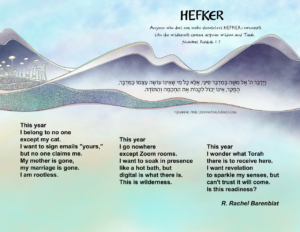 New from Bayit’s Liturgical Arts Working Group comes this collaborative compilation of liturgy, poetry and art for this second pandemic Shavuot.
New from Bayit’s Liturgical Arts Working Group comes this collaborative compilation of liturgy, poetry and art for this second pandemic Shavuot.
Exploring themes of standing together at Sinai (even when we’re apart), the harvest of first fruits, the mountain where we journey and the mountain over our heads, being “ownerless” in the wilderness, and more, these poems and prayers and illustrations are meant for personal and communal use. We hope they speak to you and open you more wholly to this year’s revelation.
Read excerpts and download here: Together, Becoming: Shavuot 2021.
Yearning For Our Plague to End: Lag Ba’Omer 5781 / 2021
 New from Bayit’s Liturgical Arts Working Group comes this collaborative compilation of poetry and art for Lag Ba’Omer.
New from Bayit’s Liturgical Arts Working Group comes this collaborative compilation of poetry and art for Lag Ba’Omer.
The 33rd day of the Omer is understood in Jewish tradition as the final day of a plague afflicting Rabbi Akiva’s students. What meaning can we find in that teaching this year, as COVID-19 continues to rage worldwide even as vaccinations in some of our nations crest toward safety? Here are poems, reading, and artwork offering some answers to that question.
Read excerpts and download here: Yearning For Our Plague to End: Lag Ba’Omer 2021.
Approaching Our Second COVID Seder
 Poetry, liturgy, and artwork for this second pandemic Pesach. This collaborative collection is available in two formats: as a downloadable PDF (suitable for printing to accompany a printed haggadah), and as a set of google slides (suitable for screenshare for Zoom or other online / streamed sedarim.) Here too are a handful of pieces to mark the seventh day of the festival, when tradition says we took the plunge and crossed the sea.
Poetry, liturgy, and artwork for this second pandemic Pesach. This collaborative collection is available in two formats: as a downloadable PDF (suitable for printing to accompany a printed haggadah), and as a set of google slides (suitable for screenshare for Zoom or other online / streamed sedarim.) Here too are a handful of pieces to mark the seventh day of the festival, when tradition says we took the plunge and crossed the sea.
What does it mean to approach the season of our liberation when so many of us feel we are still in Mitzrayim / in the Narrow Place of pandemic, economic uncertainty, and global grieving? What do we carry with us on the journey? How will this seder be different from all other seders, even the first pandemic seder we celebrated a year ago? What words, images, practices, and prayers can help us connect with liberation in this season?
Read excerpts and download here: Approaching Our Second Covid Seder.
The Lot of One Year – Liturgy, Poetry, and Art for Purim 2021

New from Bayit’s Liturgical Arts Working Group comes a collection of poems, prayers, and artwork for this pandemic Purim. Here are meditations on (the) last Purim, and on our many-layered losses; poems on our world turning upside-down, on what our masks reveal, on grief and playfulness, on Esther and on Zeresh, on vengeance and its limitations; another new Al Hanisim looking back on Purim miracles that haven’t yet arrived; illustrations (including a printable coloring page that can be turned into a gragger); and more.
Connections – Liturgy, Poetry, and Art for Tu BiShvat
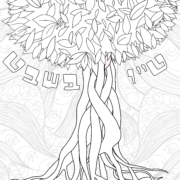 An interdisciplinary and pluralist collection of new work for Tu BiShvat, the New Year of the Trees: “TU biShvat is an invitation to focus on the natural world surrounding us–and at the same time, it makes us aware of our connectedness to each other, to the flow of time and stories, to the flow of cyclical renewal, to the spiritual worlds…This year, connection also is digital–we use a digital ecosystem to supplement a natural one…”
An interdisciplinary and pluralist collection of new work for Tu BiShvat, the New Year of the Trees: “TU biShvat is an invitation to focus on the natural world surrounding us–and at the same time, it makes us aware of our connectedness to each other, to the flow of time and stories, to the flow of cyclical renewal, to the spiritual worlds…This year, connection also is digital–we use a digital ecosystem to supplement a natural one…”
Here are prayers and practices for solitary pandemic celebration, meditations on trees in urban settings, coloring pages for contemplative creativity, prayers looking ahead to the year 2030, and more.
This collection was co-created by Trisha Arlin, R. Rachel Barenblat, R. Allie Fischman, R. Dara Lithwick, R. David Evan Markus, R. Sonja Keren Pilz, and Steve Silbert, and is intended for use by individuals and communities across and beyond the denominational spectrum. Read excerpts and download here: Connections.
Great Miracles Happen Here
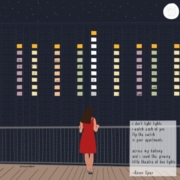 This new collaborative offering from Bayit’s liturgical arts working group comes to bring light in dark times. Here you’ll find new liturgy (including an “Al HaNisim” looking back on the miracles we haven’t yet lived into being, and a “Hanerot Hallalu” for this pandemic year), evocative poetry (on finding light without a chanukiyah, on kindling lights alone, on the windows where we light our lights and the Zoom windows where the pandemic allows us to gather, and much more), and meditations on Chanukah through all five senses, all accompanied by heart-opening artwork.
This new collaborative offering from Bayit’s liturgical arts working group comes to bring light in dark times. Here you’ll find new liturgy (including an “Al HaNisim” looking back on the miracles we haven’t yet lived into being, and a “Hanerot Hallalu” for this pandemic year), evocative poetry (on finding light without a chanukiyah, on kindling lights alone, on the windows where we light our lights and the Zoom windows where the pandemic allows us to gather, and much more), and meditations on Chanukah through all five senses, all accompanied by heart-opening artwork.
This collection was co-created by Trisha Arlin, R. Rachel Barenblat, R. Dara Lithwick, R. David Evan Markus, R. Sonja Keren Pilz, R. Jennifer Singer, Steve Silbert, and Devon Spier, and is intended for use by individuals and communities across and beyond the denominational spectrum. Read excerpts and download here: Great Miracles Happen Here. And here’s a lovely review by Mark Frydenberg in eJP: Who Can Retell?
Ushpizin: Liturgy for Sukkot in Time of Covid
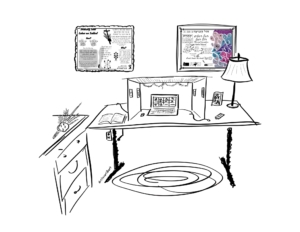 Sukkot this year will be unlike any other. Some of us won’t be able to safely build a sukkah; others will find in the sukkah the outdoor safety that indoor ventilation doesn’t provide. What does it mean to invite ancestors when we can’t invite guests in person? With what, or whom, (or Whom!) are we sitting when we dwell in our sukkot this year — whether our sukkot be literal or metaphorical? What structures can we build liturgically and spiritually to protect us in these vulnerable times? Four liturgists from within and beyond the denominations collaborated on this set of offerings from Bayit to accompany us through this year’s festival.
Sukkot this year will be unlike any other. Some of us won’t be able to safely build a sukkah; others will find in the sukkah the outdoor safety that indoor ventilation doesn’t provide. What does it mean to invite ancestors when we can’t invite guests in person? With what, or whom, (or Whom!) are we sitting when we dwell in our sukkot this year — whether our sukkot be literal or metaphorical? What structures can we build liturgically and spiritually to protect us in these vulnerable times? Four liturgists from within and beyond the denominations collaborated on this set of offerings from Bayit to accompany us through this year’s festival.
This collection is a collaboration between Trisha Arlin, R. Rachel Barenblat, R. David Evan Markus, and R. Sonja Keren Pilz, with sketchnotes by Steve Silbert.

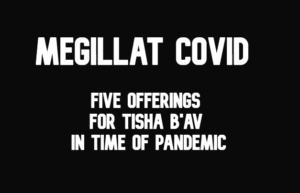 Five offerings for Tisha b’Av 2020
Five offerings for Tisha b’Av 2020